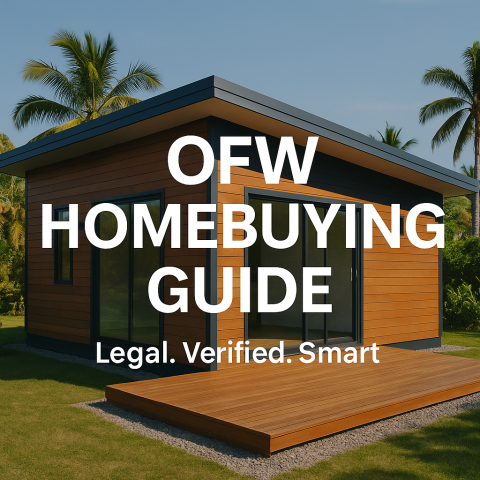OFW Property Buying Guide Philippines | Legal, Safe, Smart
Buying a House as an OFW: What You Must Know Before You Sign
Avoid costly mistakes. Build your future the right way.
1. A Home Built on Sacrifice
For most OFWs (Overseas Filipino Workers), buying a house back home is the ultimate reward for years of hard work abroad. It’s about security, legacy, and dignity.
But too many fall victim to poor advice, false promises, or rushed decisions.
This guide will help you buy legally, safely, and smart.
2. Step One: Verify the Title Before Anything Else
Never rely on a photocopy or verbal assurance. Always:
Request a Certified True Copy of the land title from the Registry of Deeds
Make sure the seller’s name matches the title
Check for encumbrances, liens, annotations, or ongoing disputes
Ask for updated Tax Declaration documents and real property tax receipts
Estimated cost for verification: ₱200–₱500
3. Hire a Lawyer or Licensed Real Estate Broker
A licensed real estate broker can help you find valid listings and assist with paperwork.
A lawyer is essential to draft or review the Deed of Sale, perform due diligence, and assist with title transfer.
Cost estimate:
Lawyer: ₱10,000–₱30,000
Broker: Usually paid by seller (3–5% of property price)
4. Inspect the House with a Professional Engineer
Whether you're buying a finished house, townhouse, or second-hand property, you should:
✅ Hire a licensed civil engineer or appraiser to check:
Structural integrity (foundation, roof, walls)
Electrical and plumbing systems
Water source and drainage
Signs of termites, leaks, or illegal extensions
Validity of the Building Permit and Occupancy Permit
Inspection cost: ₱5,000–₱20,000 depending on property size and scope
5. Understand the Full Legal and Transfer Costs
When buying property, be prepared to pay more than just the selling price.
FeeWho PaysRate / Amount
Capital Gains Tax (CGT)Seller6% of selling price / zonal value
Documentary Stamp TaxBuyer1.5% of selling price
Transfer TaxBuyer0.5–0.75% (varies by LGU)
Registration FeeBuyer₱8,000–₱15,000
Notary FeeShared₱1,000–₱5,000+ depending on contract
➡️ Always budget an extra 8–10% of the total property value.
6. Buying Through Bank or Pag-IBIG Loan
If you're not paying in cash:
Get a Loan Pre-Approval
The property must have a clean title
It must pass the bank’s appraisal
Pag-IBIG and banks will charge processing and appraisal fees (₱3,000–₱10,000)
7. Avoid These Common Mistakes
❌ Buying property in someone else’s name (even family)
❌ Paying without notarized contracts
❌ Not verifying land ownership or tax status
❌ Ignoring building code violations
❌ Letting someone else decide everything while you're abroad
✅ Conclusion: Protect Your Sacrifice
OFWs often work decades for what they build. Don't lose it in one bad decision.
With the right legal steps, professional inspections, and clear documentation, your home can truly be the legacy you dreamed of.
Even from abroad — you can buy safely, legally, and with peace of mind.
Autor: Nils Deden


Comments
There are no comments yet